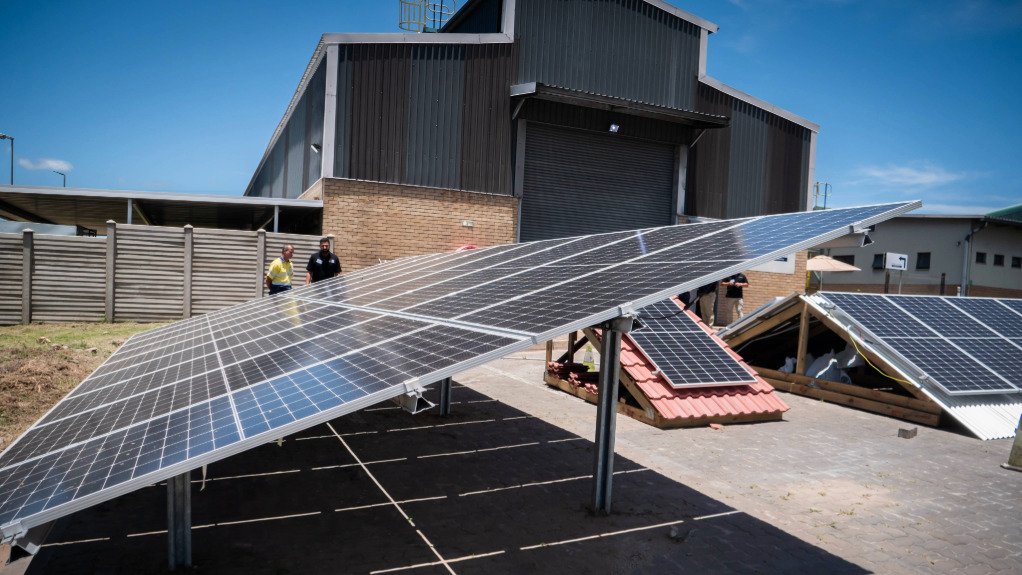EU targets carbon emissions through import tariff


WEIGHING OPTIONS Businesses exporting to the EU will incur import charges according to Carbon Border Adjustment Mechanism if they do not invest in renewable-energy
The EU’s Carbon Border Adjustment Mechanism (CBAM), set to come into effect in 2026, is poised to drive companies exporting to the EU to rethink their energy strategies and adopt renewable-energy solutions, such as solar power, says solar installation specialist Solana Energy business development lead Ahmed Motara.
“The CBAM is an innovative policy tool designed by the EU to address carbon leakage and support the EU’s ambitious climate goals.”
The CBAM will impose import charges on products, such as steel, cement and electricity, based on the CO₂ emissions embedded in their production. By levying these charges, the EU aims to level the playing field between domestic producers, who are subject to strict carbon regulations, and foreign producers, who may not face similar constraints.
Therefore, businesses aiming to export, or which are exporting, to the EU will have to approach reducing carbon emissions as a strategic imperative, Motara asserts.
He adds that the sectors most likely to be affected by the CBAM are those heavily reliant on EU exports such as the chemicals and manufacturing industries. These traditionally carbon-intensive sectors will face increased costs and compliance requirements under the CBAM.
Therefore, these industries, particularly the South African chemicals sector, which is a significant exporter to the EU, will need to adopt greener practices to mitigate these costs and maintain market access.
Motara advises South African businesses to prepare for the CBAM by investing in renewable-energy solutions, such as solar power, to reduce their carbon footprint. Additionally, they should develop robust systems to measure and report the carbon content of their products accurately.
“By proactively adopting sustainable practices and energy efficient technologies, businesses can avoid hefty CBAM import/export tariffs and position themselves competitively in the EU market,” he says.
Costly Compliance
A primary concern of South African exporters regarding the CBAM is the direct cost of carbon charges, which could make their products more expensive and less competitive in the EU market, Motara notes.
The cost of compliance is another major concern, which involves investing in accurate measurement and reporting systems for carbon emissions. Such costs can be significant, as businesses are required to invest in advanced monitoring technologies and data management systems.
These upfront investments, along with the initial capital investment required for sustainable technologies, such as solar energy, can financially strain smaller businesses, potentially impacting on their profitability. However, accurate reporting is crucial for avoiding penalties under the CBAM and maintaining access to key markets such as the EU.
Further, Motara notes that businesses may face regulatory uncertainty as policies evolve, making long-term investment planning more challenging. A lack of technical expertise and adequate infrastructure may also impede the adoption of green practices.
Solar Savings
While the adoption of solar energy – driven by the need for energy security and cost savings – among South African businesses is growing, the adoption rate is still uneven, with larger corporations leading the way because smaller enterprises must overcome the high initial investment cost barriers.
Motara says many businesses recognise the benefits of solar power, such as reduced electricity costs and compliance with environmental regulations.
Integrating solar energy significantly reduces carbon emissions and, as solar power produces no direct carbon emissions, it assists companies in meeting stringent environmental standards and avoiding hefty charges under mechanisms such as the CBAM, he explains.
According to intergovernmental organisation International Renewable Energy Agency, renewable energy and electrification can deliver 79% of the energy-related CO₂ missions reductions needed, he points out.
“Solar energy is a crucial component in any business’s strategy to mitigate carbon footprints and comply with international environmental standards,” Motara adds.
Further, tax incentives under Section 12BA of the Income Tax Act enable businesses to deduct a portion of their investment in renewable-energy systems, such as solar power installations, from their taxable income.
These incentives can significantly offset the initial investment costs, making solar energy more financially accessible and attractive. Additionally, they encourage businesses to invest in sustainable energy solutions, leading to long-term savings and improved market competitiveness, Motara explains.
As global markets increasingly prioritise sustainability through regulatory frameworks, such as the CBAM, it is important for South African businesses to broaden their view of sustainability from merely a compliance requirement to a strategic advantage, he adds.
Investing in solar energy is a practical step towards reducing carbon emissions, cutting costs and ensuring long-term market access. By aligning their practices with global sustainability values, businesses can position themselves for continued success amidst evolving regulatory landscapes, Motara concludes.
Article Enquiry
Email Article
Save Article
Feedback
To advertise email advertising@creamermedia.co.za or click here
Announcements
What's On
Subscribe to improve your user experience...
Option 1 (equivalent of R125 a month):
Receive a weekly copy of Creamer Media's Engineering News & Mining Weekly magazine
(print copy for those in South Africa and e-magazine for those outside of South Africa)
Receive daily email newsletters
Access to full search results
Access archive of magazine back copies
Access to Projects in Progress
Access to ONE Research Report of your choice in PDF format
Option 2 (equivalent of R375 a month):
All benefits from Option 1
PLUS
Access to Creamer Media's Research Channel Africa for ALL Research Reports, in PDF format, on various industrial and mining sectors
including Electricity; Water; Energy Transition; Hydrogen; Roads, Rail and Ports; Coal; Gold; Platinum; Battery Metals; etc.
Already a subscriber?
Forgotten your password?
Receive weekly copy of Creamer Media's Engineering News & Mining Weekly magazine (print copy for those in South Africa and e-magazine for those outside of South Africa)
➕
Recieve daily email newsletters
➕
Access to full search results
➕
Access archive of magazine back copies
➕
Access to Projects in Progress
➕
Access to ONE Research Report of your choice in PDF format
RESEARCH CHANNEL AFRICA
R4500 (equivalent of R375 a month)
SUBSCRIBEAll benefits from Option 1
➕
Access to Creamer Media's Research Channel Africa for ALL Research Reports on various industrial and mining sectors, in PDF format, including on:
Electricity
➕
Water
➕
Energy Transition
➕
Hydrogen
➕
Roads, Rail and Ports
➕
Coal
➕
Gold
➕
Platinum
➕
Battery Metals
➕
etc.
Receive all benefits from Option 1 or Option 2 delivered to numerous people at your company
➕
Multiple User names and Passwords for simultaneous log-ins
➕
Intranet integration access to all in your organisation


















